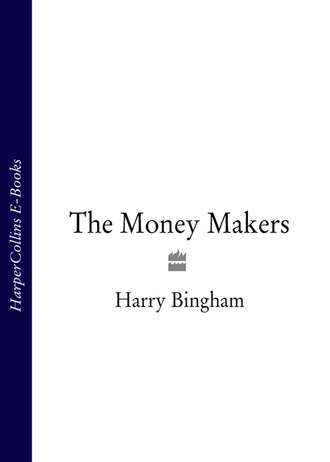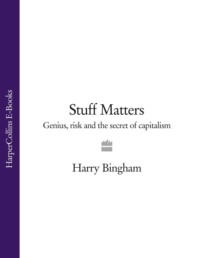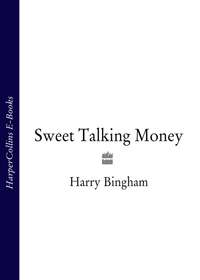
Полная версия
The Money Makers
Ballard’s office overlooked the old market square in Richmond, a well-to-do market town in North Yorkshire. The room was furnished by Ballard himself, not his employer, and the result was welcoming and warm. Ballard had been offered promotions, but he refused anything which took him away from Yorkshire. His clients loved him and his bosses left him alone. He welcomed George with coffee and biscuits.
‘Well, well, George. It’s a while since I’ve seen you. Very sorry to hear about your father’s death. Very sorry indeed. You must be very cut up, I suppose. How’s poor Helen taking it?’
Ballard munched on the biscuits as he spoke. He was a fat man with greying hair and moustache. He had the no-nonsense mouth of the tough banker and the twinkly eyes of a kind and humorous man. Crumbs from his biscuits lodged inside his moustache.
George shrugged. According to Josie, their mother was in a very bad way indeed, having teetered on the brink of following their father into the night. As it was now … but Ballard didn’t need to know the real, gloomy story. A brightly-coloured fairy tale would do for him.
‘Mum’s taken it OK to be honest,’ said George. ‘As you know, there wasn’t much love lost between Mum and Dad by the end. She’s just pleased that the money’s coming into the family proper after being under lock and key for so long.’
The will was secret, but Ballard knew as well as anyone how much Bernard Gradley was worth. If George could con him into believing he was about to inherit millions, then getting him to show a bit of grace with Gissings shouldn’t be so tough.
‘Yes. A few million must dull the edge of pain I suppose. Especially if you couldn’t stand the old bastard – and I speak as a friend of the old bastard, as you know. Still you haven’t come here to talk about that, I guess. Proud proprietor of old Tom Gissing’s shop, eh? Wouldn’t quite guess it. Not from the look of you. Still, stranger things have happened. How can I help?’
‘Well I owe you half a million quid, give or take.’
‘That’s right. But it’s give not take. Five hundred and forty-eight thousand, seven hundred and eighty-two pounds. Due close of business on Friday.’
‘That’s fine, but I wonder if we could sort out an extension. Two or three months perhaps?’
‘An extension? With all that cash from your dad?’
There was a twinkle in Ballard’s eye, but his mouth was unforgiving, and it was the mouth talking.
‘Nothing has yet been released by the estate’s executors,’ said George truthfully. ‘There are death duties, valuation of the business, all the rest of it. Until I get my slice of the pie, I’m as poor as a church mouse. What I want is to defer the loan until I can recapitalise the business, write off the debt, give it a healthy balance sheet once again.’
‘You have a letter from the executors? I might be able to grant a deferral if you had a letter.’
George stuttered for a moment. He could get a letter. It just wouldn’t say what he needed it to say.
‘Er – I guess so. What I don’t know is whether I can get it in time. There’s a whole bunch of executors and the legal palaver seems to take for ever.’
Ballard checked some figures on his desk.
‘The interest payment due on Friday is around six grand. If you get that to us plus another thirty grand as an advance on the next series of interest payments, then I’ll give you a temporary extension. Let’s say three months, shall we?’
George nodded without being able to speak. In his mind’s eye, he’d expected Ballard to nod the whole thing through without a hint of difficulty. As it was, Ballard had hardly helped at all.
Emerging blinking into the market square, George chased a traffic warden from his illegally parked car, pulled out his mobile phone and started to dial. He had five days to find thirty-six grand. If he couldn’t, he would be the shortest lived proprietor The Gissings Modern Furniture Company (Limited) would ever know.
8
Not dead, thank God, but very, very ill.
An ambulance had come quickly. A kind paramedic had been swift to reassure a distraught Josephine that her mother’s pulse was steady, her breathing weak but constant. The journey to hospital was an unremembered rush of sirens and flashing lights. Once there, Helen Gradley was thrust fast and unemotionally on to the processing line of the modern NHS. Her case was serious and, queue-jumping the groaning hordes in casualty, she was placed immediately into intensive care. Through that night and the days that followed, diagnosis and prognosis became clearer.
Helen Gradley had had a stroke, a stoppage of blood to the brain. The consequences were hard to predict, even for a specialist. Some people lost speech, lost coordination, lost memory, then recovered the lot within weeks and months. Others might lose less, but lose it for good. With Helen, whose stroke had been severe, only time would tell.
And Josephine? That first night at the hospital she had sat up all night with her mother. Doctors had come and gone, giving conflicting advice, rushing off at the command of a pager, too busy to do their job. Josie, in her party dress still, held her mother’s hand, whispering encouragement. She remembered the mood she’d been in, climbing the hill towards home: her anger, her passionate demands for her old life back. That was all gone now. Helen Gradley, for so long the shield between her children and their father, the victim of an unfair divorce and a cruel will, lay in bed, helpless as a baby, looking to her daughter for help.
Josephine was just seventeen. She had never expected to earn a living, let alone care for a disabled parent, but she knew her duty. ‘It’s OK, Mum. I’m here,’ she said.
9
It’s a common problem amongst bankers. You work hard all day. You come home tired as a dog in a heatwave. Then when at last you collapse into bed, you can’t even sleep. Worse still, you do sleep and your dreams are full of the rubbish you’ve spent your day with. Numbers walk past in an endless stupid procession. You’re no longer you. You’re just a cursor flashing in a crowded spreadsheet, roving up and down, sorting out numbers, the last traffic cop left alive in Gridlock City.
It was three o’clock in the morning and Zack threw off the covers. He groaned. Outside there was a distant whistle of traffic from Camden High Street and the sound of a milk float clinking. Zack tried to let the sounds drift in and over the clickety-click of marching numbers.
He put the light on, splashed water on his face, then decided to have a shower. Maybe that would wash the rubbish away. He stood under the jet of water and scrubbed himself with the Boots aromatherapy shower gel which Josephine had given him for his birthday. It was a rather pointed present, bought for less than a tenner – Josie’s way of reminding him that she was struggling to cope. Damn her. She’d quit complaining when Zack saved their father’s fortune single-handedly. When she had a few million quid in her pocket – money which Zack would have put there – she could buy him a decent present. The purple gel (‘Refreshing and Relaxing’) dripped off Zack’s bony figure under the spray. Numbers still chattered, but not as much.
He threw on a dressing gown stolen from the New York Plaza in happier days, and padded into the kitchen. Nothing in the fridge except a yoghurt past its sell-by date. He opened it and sniffed it. It smelled OK. What’s the difference between a yoghurt pot and Australia? The yoghurt’s got a living culture. Ha, ha. Zack ate the yoghurt and stared at the lid. The sell-by date. More numbers. He’d be dreaming about the bar code next. If he scrabbled around in the dustbin he could probably find a till receipt to read.
He went back into the bedroom and sat on the edge of the bed. Sarah Havercoombe seemed completely indifferent to him and, besides, she was engaged to be married. Coburg’s was beginning to bore him and he wasn’t close to his million pounds. He didn’t even know how he was going to make it. Meanwhile, Matthew was on Wall Street learning to trade, and George was god-knows-where doing god-knows-what. Maybe Josie was right, maybe they were all a pack of fools. Still, there didn’t seem to be much else to do except try. Go on trying until they’d reached their sell-by date.
Why was that phrase in his head so much? Sell-by date. The numbers had gone, but the phrase stayed. Probably something to do with that blasted Aberdeen Drilling data room. All those piles of contracts and accounts. Random phrases stuck around just like the numbers. Zack got into bed again and turned off the light. The yoghurt sat in his stomach feeling funny. It probably had been off. He tried to sleep. Sell-by date. Sell-by date.
Five minutes later, he threw off the covers and turned the light back on. Frowning with concentration, he began to bring a page from the data room into his mind’s eye. The page came, blurry at first, then in sharp focus: ‘Standard Warranties for Consultancy-type Agreements’. Zack read the words below the title. It was drafted in legal language so dense you could saw it into blocks and build with it, but to Zack the meaning was clear. He brought another page to mind. It appeared, then cleared, like the one before: ‘Insurance Arrangements: Provisions and Exclusions’. Zack gazed at the remembered page. Things were becoming clear. No wonder he couldn’t sleep. Just one more check to make: ‘Schedule of Principal Consultancy Projects, 1988–98’. The page began to clear, but Zack hardly needed to look at it to know what it said.
He turned off the light and slept like a baby.
10
Through the slatted blinds behind the students, the Hudson River emptied into the Atlantic Ocean. The waters were crowded with traffic and in the late summer sun, the Statue of Liberty waved her torch, calling order to the congested skies. The gateway to the free world isn’t too keen on the weary and dispossessed these days, but it sure has time for anything which can be packaged, shipped and sold. Away to the south west, too far to be seen in the haze, the port authority’s cranes kept the flood of goods moving swiftly on.
None of the students had their eyes on the scene. You could stack up all the cargo passing through the air and sea ports of New Jersey and New York in a year and you’d have a mountain big enough to boast a skiing industry. But the whole enormous pile wouldn’t be worth a thousandth part of the invisible cargo which passes noiselessly down the electronic thoroughfares of Wall Street.
The market for US government bonds is worth over six trillion dollars. The foreign exchange market turns over a trillion dollars each and every working day. The US stockmarkets are capitalised at fourteen trillion bucks. The market for corporate bonds and bills, and certificates of deposit, and a hundred other varieties of security add trillions more to the total. And each of these bits of paper belongs to investors, skilled and unskilled, wise and foolish, twisting and turning to dodge losses and snuffle out profit.
Wall Street does various things, some good for the world, others not so good. But its main function is simple: it’s a bureau de change where investors can sell one bit of paper and buy another. And every time a bit of paper changes hands, leaving an investor happy and excited about the future, there is another person even happier. That person is the Wall Street trader who did the trade. For every dollar that changes hands, a tiny amount of change stays in the hands of the trader. In some markets, the amount of change is almost microscopic. In the foreign exchange markets, the Wall Streeter might keep just a few hundredths of a cent. In the stockmarket it might be half a cent, sometimes as much as two or three.
But traders don’t care that their take is small. If you multiply by a million dollars, one tenth of a cent is worth a thousand bucks. Multiply by a billion, and that tenth of a cent is worth a million dollars. And if you’re sharp enough and smart enough to squeeze out two tenths of a cent, then the investor still hardly cares – what’s two tenths of a cent to him? – but you’ve doubled your take to two million bucks. Keep at it and before long you’ll have your nice house in Long Island, your German sports car and your decent sized yacht. Your kids will go to the right schools, your wife will be invited to the right parties, and you will no longer keep in touch with your pals from college who got better grades than you but who made the life-destroying error of opting for a career in engineering or civic service.
Life as a Wall Street trader can be very sweet. And that, of course, is why the students were there.
Matthew looked around. Sophie was sitting diagonally in front of him. He caught her eye and smiled at her. She smiled back. It hadn’t been his imagination. She was still gorgeous, with her perfect figure and a complexion so nice you wanted to sing to it. Matthew definitely wanted to get to know her.
A tall blond Californian barged along the row of seats and sat down next to Matthew.
‘Mind if I sit here? My name’s Scott Petersen. Nice to meet you.’
Scott Petersen was an inch or two taller than Matthew, an inch or two broader and maybe an inch or two better looking. Matthew disliked him at once.
‘Hi. Matthew Gradley.’
They shook hands.
‘From England, right?’
‘Right.’
‘At least that’s easy,’ said Petersen, looking round the room. ‘We’ve got twenty-two North Americans, same number of Europeans, then maybe fifteen or twenty from everywhere else. Mostly Pacific Rim, I guess, but I bumped into a couple of South Americans earlier and I know there’s a Russian and some kind of Middle Eastern oil princess.’
Matthew nudged his neighbour. Down the row to Matthew’s right came a plump dark-skinned girl, her hair piled up and fastened with a couple of heavy gold clips. Gold glittered and clunked at her fingers, wrist and neck. She walked looking straight ahead, her heavy-set face impassive.
‘That’s her,’ whispered Petersen. ‘I’ve heard she only just managed to graduate from college and her English is none too good either. But her family controls oil reserves worth tens of billions of dollars and –’
Petersen shrugged. He understood it, but he didn’t like it. At Madison merit is the only way to get ahead, but merit comes in different shapes, and the podgy figure of the oil princess was one of them. Matthew turned to her.
‘How do you do,’ he said. ‘Matthew Gradley.’
‘Yes. How do you do,’ replied the girl in a heavy accent. ‘Fareshti Al Shahrani –’
Anything further she had intended to say was interrupted as the entrance door opened and a man strode across to the podium. The students fell silent. The man was Dan Kramer, the Lion of Wall Street.
The old-fashioned walnut podium concealed a battery of switches controlling the sound system, lights, blinds, screens, projectors – everything. But Kramer stood away from the podium. He hadn’t any slides, and his voice needed no amplification. He was not a large man, but with a mane of dusty blond hair bristling round a granite face, he didn’t need to be large to be awe-inspiring. When Time magazine had done a cover story on Kramer entitled ‘The Lion of Wall Street’, the nickname became permanent. When he was calm, he looked fierce. When he was angry, he was terrifying. Today Kramer was not angry, but he was emphatic.
‘My name is Daniel Kramer. I am the Chairman and Chief Executive of Madison. I would like to welcome you all to this training programme today.’
He grinned, but his smile cheered no one. It showed too many teeth and lasted a few seconds too long.
‘You succeeded in obtaining a job here because the people who interviewed you believed that you have what it takes. We try hard to be right because it’s a waste of our time being wrong. But we do get it wrong, about one time in three. When we screw up, we say sorry and ask you to leave. We don’t want you to have a nasty life, but we want you to lead it outside of this organisation.
‘Those of you who remain with us will sometimes wonder if you made the right choice. The work is hard, the pressure is relentless. Each time you think you’ve mastered a task, we will increase your responsibilities, demand more from you. You will meet every challenge or you will leave the firm. If you continue to succeed, you will earn sums of money that are unimaginable to all but a tiny fraction of the population. You will also have the satisfaction of knowing that you’ve made it in one of the world’s most demanding workplaces. So much for your rewards.
‘More important to me are the rewards for the firm. I am sometimes asked to define our strategy. That’s easy. In every country where we operate, we recruit the best. Once we’ve recruited them, we retain them. Then we just get on with our jobs, as best we can. That’s it. The rewards for the firm will follow.’
Kramer continued to prowl to and fro across the floor of the amphitheatre.
‘Are there any questions?’
Coming from him, this wasn’t a question. It was a joke. Nobody asked a question, nobody ever had since Kramer started giving these speeches. He smiled once more. Too many teeth again and the smile lasted long after the light had vanished. Without another word, the Lion of Wall Street stalked from the room.
Matthew knew beforehand that Kramer wasn’t exactly a touchy-feely kind of guy. And Matthew didn’t just cope with competition; he thrived on it. All the same, Kramer was genuinely menacing, and Matthew’s mouth felt dry. He glanced downwards and across to where Sophie was sitting. She looked completely composed. She wasn’t licking her lips, or shifting in her seat, or fiddling with her pencils, or doing any of the other things that the other students were doing. She just looked beautiful and desirable. Matthew forgot Kramer.
He opened his folder and took out a card which he’d bought that morning. He scrawled something inside, scribbled Sophie’s name on the envelope, and tossed it accurately on to her desk.
She looked round to see where it had come from and sent Matthew a polite smile. She opened the envelope and read the card. She smiled, not politely this time, and sent Matthew a look, which meant ‘Yes’. With a bit of luck it even meant, ‘Yes, please, I’d be delighted’.
The inscription inside the card was brief. It ran: ‘Dear Mrs Gradley, as today is the first day of our honeymoon, perhaps you would care to dine with me this evening? Eight at The Riverside. Your loving husband, Mr Gradley.’
11
Hank Daggert, the Chief Executive of Tominto Oil, didn’t care too much for the mother country. He liked some things, of course. He liked Maggie Thatcher, the flexible labour market and North Sea Oil. But the list of things he didn’t like was much longer. He disliked the Queen, trade unions, New Labour, John Lennon, unarmed policemen, the BBC, hot tea, warm beer, and cold rooms. He didn’t like the bunch of old Etonians who were helping him buy Aberdeen Drilling but he hadn’t much choice. He was buying a British company and he figured that picking Coburg’s, the biggest independent British bank, was the best way to succeed. All the same, Daggert listened to Piers St George Hanbury with growing irritation.
‘You’re telling me there was a time bomb in that data room all along?’
‘Yes. We believe you should reduce your bid by ten million pounds or insist that the seller insures you against any liability you might be taking on.’
‘Jesus. We’re only a fortnight away from making our final offer. Couldn’t you have told me this sooner?’
‘Yes, I understand. The problem was very carefully hidden, and it took us some time to spot it. But we thought you would sooner know late than not at all.’
‘You’re telling me,’ growled Daggert. Tominto Oil was worth about a billion dollars and Daggert owned about five percent of it. Hank Daggert wasn’t exactly a sweet old man, but if you were a shareholder in Tominto Oil you loved him just the same. ‘Just take me through the problem one more time. I want to be sure I understand.’
Piers Hanbury was too important to care much about details. He was one of the biggest deal-makers in the City of London and he wasn’t unduly fussed over a hundred million pound deal with a miserable little million pound fee. He was there to look distinguished and make the client feel happy.
‘Zack, why don’t you walk us through this?’ said Hanbury smoothly. ‘It’s your discovery, after all.’
Hanbury was polite in front of a client, but he’d been absolutely furious with Zack the day before. ‘Why the hell didn’t you bring this up sooner? We don’t stand a chance of doing the deal now.’ Hanbury was sore.
One thing about buying companies is different from buying a car. With a car, when you call out the AA to inspect it, you pay the AA a flat fee irrespective of whether you end up buying the car. That way you can be sure of getting impartial advice. If you agreed to pay only if the inspection was clean, you’d find yourself with clean reports for cars only a tow-ride away from the breakers’ yard.
For some reason, which no one on earth can explain, it doesn’t work like that when it comes to buying companies. Corporate financiers only get paid if they win the deal, if their client beats the other bidders. The temptation to encourage the client to bid too much is almost overwhelming – and every now and then, there are those who don’t try so hard to resist. Piers St George Hanbury was one of them. If Zack had found the problem when they were in the data room a couple of weeks back, Hanbury would have found other reasons for getting Tominto Oil to pay up for Aberdeen. But now they’d debated the price and fixed it, when bloody Zack Gradley comes along with a ten million pound hole. The deal was running into the sand.
‘OK,’ said Zack. ‘The seller had a problem. They were all ready to sell Aberdeen Drilling, when along comes a major headache. A Norwegian consultancy project they’d worked on returned to haunt them. They’d advised on the construction of a North Sea pipeline into Bergen. They did their work, got paid, and forgot about it. But to win the contract, they had offered a guarantee. Either the work’s OK or they’d pay to put it right. That was the deal.
‘Now, just as they were getting ready to invite you guys into the data room, the Norwegians come along. It turns out there was a major foul-up which the Norwegians say is the fault of Aberdeen Drilling. Well, maybe, maybe not. It hasn’t been tested in a court of law, but let’s just suppose the Norwegians are right and Aberdeen did screw up.
‘Normally, that wouldn’t be too bad. They’ve got insurance. If they have to pay out to the Norwegians, they just get the cash back from the insurers. But here’s the problem. When they signed the Norway contract, they weren’t insured. There was a cock-up in accounts and they were a week late in making a premium payment, something to do with staff sickness, I think. Anyway, the week the contract was signed, they weren’t insured. The sellers are desperate to sell before the liability hits, plus they want to make sure the buyers don’t see what’s coming.’
‘But you said all this was in the data room? Why would they go and tell us if they wanted to keep it quiet?’
Zack smiled.
‘They had to put it in the data room or else you could claim the money back on the warranty. So what they did was smart. They dismantled their time bomb. They broke it into four little pieces and hid three of them in the data room and one in the press. Any of those bits on their own is harmless. But the four of them together stand to make a very loud bang.’
‘Go on.’
‘The first part of the bomb was concealed in some standardised consultancy agreements. That’s where they told us that all their consultancy work was guaranteed. Any problems down the line would need to be paid for. The second part of the bomb was buried in a footnote way down in a mountain of stuff to do with insurance contracts. The footnote pointed out that there was a period of a few days where these insurance arrangements didn’t apply. The third part of the bomb was a note mentioning when the Norwegian contract had been signed, which was – surprise, surprise – bang in the middle of the time when the insurance was on the blink. If you like, the deal was signed after the insurance had passed its sell-by date.







